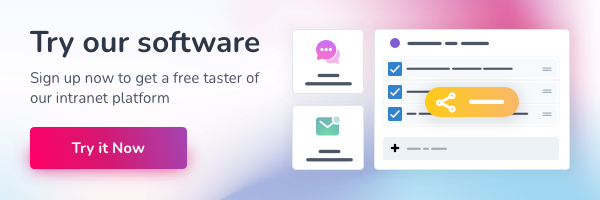Not all financial institutions and banks are the same, but their intranet banking software can follow similar patterns. It’s far from being a case of “one size fits all”, but that all financial intranets share the same goal of being user-friendly and easy to navigate, while delivering value for money.
By enabling employees to have up-to-date information at their fingertips, especially those staff who meet customers face-to-face, such as bank tellers, it creates a more professional approach.
This is obviously of immense importance to customers if they’re trusting a bank or other financial institution with their money.
While every company and organisation require an intranet that’s tailored to its needs and culture, some patterns emerge in terms of the general needs of banks and other financial institutions.
Focus on staff who deal directly with customers
Intranets for banks must have a clear focus on customer-facing staff, such as bank tellers, loan administrators, mortgage advisers, business banking officers, credit union staff, and call centre operatives who deal with credit cards, loans, and other financial transactions. The most crucial factor is providing them with the information they need at their fingertips, so that it’s easy to advise customers, whether on the phone or in person.
These people are the public face of the bank or financial institution and how their efficiency is perceived can influence customers’ experiences.
An unpleasant experience can lead customers to stop banking with you, telling their friends and family what a poor service they felt they received. An enjoyable experience can spur customers into expanding their dealings with you, speaking positively about the service they enjoyed, thus encouraging potential customers to inquire themselves.
Increase customer satisfaction
By making sure financial intranet solutions deliver the relevant information about bank services and products to the front-line staff, your organisation is presenting a professional front.
The type of information these employees need includes details of the different accounts on offer and what the interest rates and fees will be; the current interest rates; how to use online banking; reporting suspected fraudulent activity; and cancelling transactions if necessary.
By enabling these employees to do their jobs more easily, the customers’ confidence in the organisation will increase. Customer satisfaction can directly impact on a bank or financial institution’s profits.
One of the main complaints from customers is that they’re fed up of poor service and this has a negative impact on spending and business. This provides a good case for investing in financial intranets.
Provide a specific bank intranet section for customer-related information
A crucial factor in all bank intranets is providing an efficient navigation system to house information about services and products.
This can include such information as a people directory, a section about the company, details of the products and services, and even a social section, where employees can interact with each other.
The information must be arranged in a way that makes sense to all employees. By having a navigation system that’s easy to use, the amount of time employees spend searching can be drastically reduced, increasing productivity and employee satisfaction.
Information relating to branch operations
Another common pattern that emerges in bank intranet is the need for information about branch management and their day-to-day needs.
This can include information about safety protocols, procedures for bank tellers about cash-in and cash-out, opening and closing procedures, branch inspections, and courier pick-up times, for example.
This information is highly relevant to the front-line team. It can be stored in a “products and services” area, or in “banking services”. It’s a clever idea to test the intranet system with staff to find out where they’re most likely to look for information before rolling out the software company-wide.
Knowledge-sharing and employee engagement
Intranet software is important in building a positive environment for bank employees, keeping them engaged and helping them to enjoy their duties and share their knowledge. Popular aspects of the software include an up-to-date, detailed employee directory, discussion forums about services and products where staff can share knowledge, and a chance for staff to “like” content and publicly thank each other.
There can also be an employee classifieds section and community space so staff can share personal information, such as recipes, information on social groups, details about sports teams and information on community events.
All of this is important in building a sense of community and belonging among employees, which will help staff retention. The key is creating an intranet that fits in with company culture.
In conclusion, bank intranet software can help any bank, credit union, or other financial organizations to deliver a better product for customers and engage staff, leading to increased productivity.
First, identify your business’s particular needs and who the customer-facing staff are, then research their common daily tasks and requirements and structure the software around this information.
Finally, add social intranet banking software to support knowledge-sharing, collaboration, and internal communication. Happy staff work more efficiently, providing a better level of customer service, which in turn creates a greater level of customer retention and increases profits.






